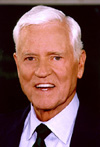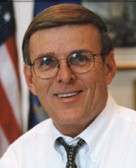| News from July 26-31, 2002 |
 He then turned to Sen. Breaux's proposal. "And what the
gentlemen from Louisiana says, we want parity. We want parity, parity. They got
parity. One has got a monopoly -- the cable crowd going into the residences --
and the DSL crowd going into the businesses. Most of them got about 80%. Now,
what we have resisted here on the Senate side is the standing monopoly. Or, this
idea of giving them parity is giving them both a monopoly. That is not
competition at all. And, we are not about to vote for. And even though this
Tauzin Dingell, and the parity bill, and the Bell companies buying up the
lobbyists. Every friend I have got in South Carolina -- a lawyer, has been
bought to come and see me personally -- we get together."
He then turned to Sen. Breaux's proposal. "And what the
gentlemen from Louisiana says, we want parity. We want parity, parity. They got
parity. One has got a monopoly -- the cable crowd going into the residences --
and the DSL crowd going into the businesses. Most of them got about 80%. Now,
what we have resisted here on the Senate side is the standing monopoly. Or, this
idea of giving them parity is giving them both a monopoly. That is not
competition at all. And, we are not about to vote for. And even though this
Tauzin Dingell, and the parity bill, and the Bell companies buying up the
lobbyists. Every friend I have got in South Carolina -- a lawyer, has been
bought to come and see me personally -- we get together."
 Sen Dorgan said, "You know, first of all, I like you
personally. I voted for your confirmation. But, sometimes I get heartburn when I
read the things you say in the newspapers in the speeches. You say ``I believe
we should trust that the market will lead to the most beneficial outcomes´´.
We are a great believer in the market. I studied economics, and I taught
economics, and I am a great believer in the marketplace. I am a firm believer
that in many instances you must, MUST, have effective regulation. Or, if you
don't have effective regulation, you have a perversion of the market. And, I
worry very much that a philosophy that says, well, let me take a break here and
watch things for a while." See, full story.
Sen Dorgan said, "You know, first of all, I like you
personally. I voted for your confirmation. But, sometimes I get heartburn when I
read the things you say in the newspapers in the speeches. You say ``I believe
we should trust that the market will lead to the most beneficial outcomes´´.
We are a great believer in the market. I studied economics, and I taught
economics, and I am a great believer in the marketplace. I am a firm believer
that in many instances you must, MUST, have effective regulation. Or, if you
don't have effective regulation, you have a perversion of the market. And, I
worry very much that a philosophy that says, well, let me take a break here and
watch things for a while." See, full story.